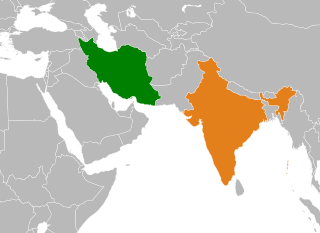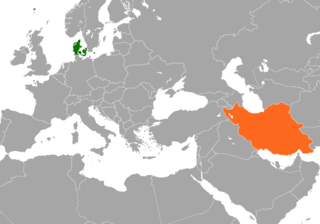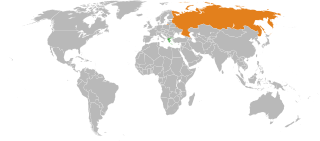
Iran and the United States have had no formal diplomatic relations since 7 April 1980. Instead, Pakistan serves as Iran's protecting power in the United States, while Switzerland serves as the United States' protecting power in Iran. Contacts are carried out through the Iranian Interests Section of the Pakistani Embassy in Washington, D.C., and the US Interests Section of the Swiss Embassy in Tehran. In August 2018, Supreme Leader of Iran Ali Khamenei banned direct talks with the United States.

German–Iranian relations are the bilateral relations between Germany and Iran. Official diplomatic relations between Iran and Germany after World War II began in 1939, when Iran opened its first diplomatic mission office in Bonn, both countries′ predecessor states had maintained formal diplomatic relations since the end of 19th century. Germany has an embassy in Tehran, which was originally established in the court of Naser al-Din Shah Qajar in October 1884 and has been in the present building since 1894. Iran opened its embassy in Berlin in 1885. Germany and Iran continued to have political relations well into World War II. In December 2022, Germany said it was "suspending state incentives to promote trade with Iran due to the repression of demonstrators."

Iran–United Kingdom relations are the bilateral relations between the United Kingdom and Iran. Iran, which was called Persia by the West before 1935, has had political relations with England since the late Ilkhanate period when King Edward I of England sent Geoffrey of Langley to the Ilkhanid court to seek an alliance.

India–Iran relations are the bilateral relationship between the Republic of India and the Islamic Republic of Iran. Independent India and Iran established diplomatic relations on 15 March 1950. However, ties between both ancient Persia and ancient India date back millennia. During much of the Cold War, relations between India and the erstwhile Imperial State of Iran suffered due to their differing political interests: India endorsed a non-aligned position but fostered strong links with the Soviet Union, while Iran was an open member of the Western Bloc and enjoyed close ties with the United States. While India did not welcome the 1979 Islamic Revolution, relations between the two states strengthened momentarily in its aftermath. However, Iran's continued support for Pakistan in the India–Pakistan conflict and India's close relations with Iraq during the Iran–Iraq War greatly strained bilateral ties. In the 1990s, both India and Iran supported the Northern Alliance against the Taliban in Afghanistan, the latter of which received overt Pakistani backing and ruled most of the country until the 2001 United States-led invasion. They continued to collaborate in supporting the broad-based anti-Taliban government, led by Ashraf Ghani and backed by the international community, until the Taliban captured Kabul in 2021 and re-established the Islamic Emirate of Afghanistan. India and Iran signed a defence cooperation agreement in December 2002.

The first Persian envoy to Denmark arrived in 1691 in order to negotiate the release of the Iranian-owned cargo of a Bengali ship seized by the Danish fleet. The Iranian diplomat had been issued with diplomatic credentials by Suleiman I of Persia and opened negotiations with King Christian V of Denmark. He was unable to secure the release of the cargo.

French–Iranian relations are the international relations between France and Iran. Iran has generally enjoyed a friendly relationship with France since the Middle Ages. The travels of Jean-Baptiste Tavernier are particularly well known to Safavid Persia. France has an embassy in Tehran and Iran has an embassy in Paris.

Relations between Afghanistan and modern Iran were officially established in 1935 during Kingdom's Zahir Shah's reign and the Pahlavi dynasty's Reza Shah Pahlavi, though ties between the two countries have existed for millennia. As a result, many Afghans speak Persian, as Dari is one of the official languages of Afghanistan, and many in Afghanistan also celebrate Nowruz, the Persian New Year.

Greco-Russian relations are the bilateral foreign relations between Greece and Russia. The two countries first entered into diplomatic relations in 1828. Both Greece and Russia are members of international organizations and agreements, including the United Nations, Organization for Security and Cooperation in Europe, and the Organization of the Black Sea Economic Cooperation.

Greece–Nigeria relations are the bilateral relations between Greece and Nigeria. Nigeria has an embassy in Athens. Greece established a diplomatic mission in Nigeria in 1970, and today has an embassy in Abuja and a consulate in Lagos. Trade between the two countries is imbalanced, with imports from Greece to Nigeria exceeding exports. Greek-owned tankers have an important role in shipping Nigerian oil and natural gas, its main exports. In 2008, a Greek tanker was involved a dispute over crude oil smuggling. Greek-controlled companies have invested US$5 billion in the Nigerian economy. There is a small Greek business community in Lagos.

Bilateral relations between Iran and Saudi Arabia have been strained over several geopolitical issues, such as aspirations for regional leadership, oil export policy and relations with the United States and other Western countries. Diplomatic relations were suspended from 1987 to 1990, and in 2016 for seven years following certain issues like the intervention in Yemen, Iran embassy bombing in Yemen, incidents in 2015 Hajj, the execution of Nimr al-Nimr, the attack on the Saudi diplomatic missions in Iran. However, in March 2023, after discussions brokered by China, Iran and Saudi Arabia agreed to reestablish relations.

Relations between the neighboring countries of Iran and the United Arab Emirates (UAE) are deeply historic, dating back centuries prior to the establishment of the modern-day United Arab Emirates; however today are shaky and unpredictable. Both the countries maintain diplomatic relations with each other, having embassies in each other's capitals.

Iran and Yemen have had cordial, if tepid, relations since the Iranian Revolution in 1979. Ties between the Saudi-backed Yemeni government in Aden, however, have been damaged in recent years by Iran's support for the rival Yemeni government in Sanaa linked to the Houthi movement. Since 2019, Iran has recognized the Supreme Political Council as the sole legitimate government of Yemen.

Kuwait and Iran have longstanding historical ties spanning hundreds of years, particularly in the pre-oil era. Relations were negatively influenced by the Iranian Revolution in 1979 and the Iran-Iraq War in the 1980s. Relations improved after the Iraqi invasion of Kuwait.
The following lists events that happened during 2015 in Greece.

Jamal Ja'far Muhammad Ali Al Ibrahim, known by the kunyaAbu Mahdi al-Muhandis was an Iraqi commander of the Popular Mobilization Forces (PMF). At the time of his death, he was deputy chief of the PMF and regarded as one of Iraq's most powerful men.

Iran–Spain relations are the bilateral and diplomatic relations between these two countries. Iran has an embassy in Madrid, Spain has an embassy in Tehran.
Iran's Islamic Revolutionary Guard Corps stated on 25 October 2021 that they had thwarted an attempt by the United States to capture and detain a tanker carrying Iranian oil in the gulf of Oman by carrying out a heliborne operation and directing the ship back to Iran's territorial waters. The Pentagon rejected the Iranian statement and said that Iranian forces had seized a Vietnamese-flagged oil tanker in October.
On 19 April 2022, the Iranian-flagged tanker Lana, with 19 Russian crew members on board, was seized by Greek authorities near the southern island of Evia; this sparked an international incident. Greek authorities had connected Russian sanctions imposed by the European Union after the Russian invasion of Ukraine in February to the tanker seizure in Greece.
The oil tanker Suez Rajan has been involved in two geopolitically prominent seizures, by the United States and Iran. In April 2023 the Greek-managed Marshall Islands-flagged oil tanker Suez Rajan was seized by US authorities, for breaching US sanctions against Iranian oil, which fell under US jurisdiction due to the use of US financial services. The US then confiscated and sold the carried Iranian oil.
Events in the year 2024 in Iran.


















